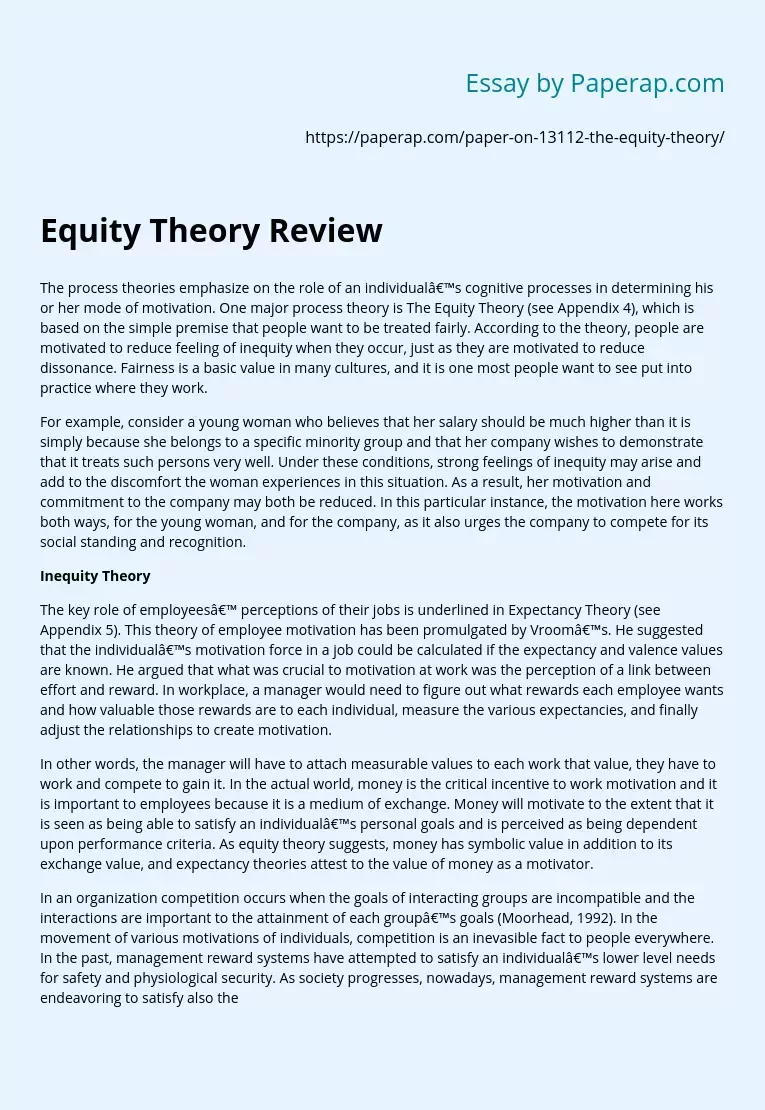Equity Theory Review
The process theories emphasize on the role of an individual’s cognitive processes in determining his or her mode of motivation. One major process theory is The Equity Theory (see Appendix 4), which is based on the simple premise that people want to be treated fairly. According to the theory, people are motivated to reduce feeling of inequity when they occur, just as they are motivated to reduce dissonance. Fairness is a basic value in many cultures, and it is one most people want to see put into practice where they work.
For example, consider a young woman who believes that her salary should be much higher than it is simply because she belongs to a specific minority group and that her company wishes to demonstrate that it treats such persons very well. Under these conditions, strong feelings of inequity may arise and add to the discomfort the woman experiences in this situation. As a result, her motivation and commitment to the company may both be reduced.
In this particular instance, the motivation here works both ways, for the young woman, and for the company, as it also urges the company to compete for its social standing and recognition.
Inequity Theory
The key role of employees’ perceptions of their jobs is underlined in Expectancy Theory (see Appendix 5). This theory of employee motivation has been promulgated by Vroom’s. He suggested that the individual’s motivation force in a job could be calculated if the expectancy and valence values are known. He argued that what was crucial to motivation at work was the perception of a link between effort and reward.
In workplace, a manager would need to figure out what rewards each employee wants and how valuable those rewards are to each individual, measure the various expectancies, and finally adjust the relationships to create motivation.
In other words, the manager will have to attach measurable values to each work that value, they have to work and compete to gain it. In the actual world, money is the critical incentive to work motivation and it is important to employees because it is a medium of exchange. Money will motivate to the extent that it is seen as being able to satisfy an individual’s personal goals and is perceived as being dependent upon performance criteria. As equity theory suggests, money has symbolic value in addition to its exchange value, and expectancy theories attest to the value of money as a motivator.
In an organization competition occurs when the goals of interacting groups are incompatible and the interactions are important to the attainment of each group’s goals (Moorhead, 1992). In the movement of various motivations of individuals, competition is an inevasible fact to people everywhere. In the past, management reward systems have attempted to satisfy an individual’s lower level needs for safety and physiological security. As society progresses, nowadays, management reward systems are endeavoring to satisfy also the individual’s higher level needs for esteem and self-actualization.
Similarly, as people progress on their work, they are constantly faced with different needs, wants, dissatisfaction, and dissonance at different stages, and in order to satisfy their needs and wants, or to overcome their dissatisfaction and dissonance, they will have to compete constantly either with one another or with themselves. Suppose that you ask a large number of individuals what is the most important motivating factor in their work, certainly, you would receive a wide range of replies.
Some individuals will consider monetary pay and various economic benefits, while other may focus on the pleasantness of the work itself, and still other will opt for opportunities for advancement or good relations with their coworkers. So much can be said about motivation factors that it is often hard to put a finger directly on it. In other words, they are motivated at various stages by various factors. But at the end of the day, it is competition that matter.
Equity Theory Review. (2019, Dec 05). Retrieved from https://paperap.com/paper-on-13112-the-equity-theory/

